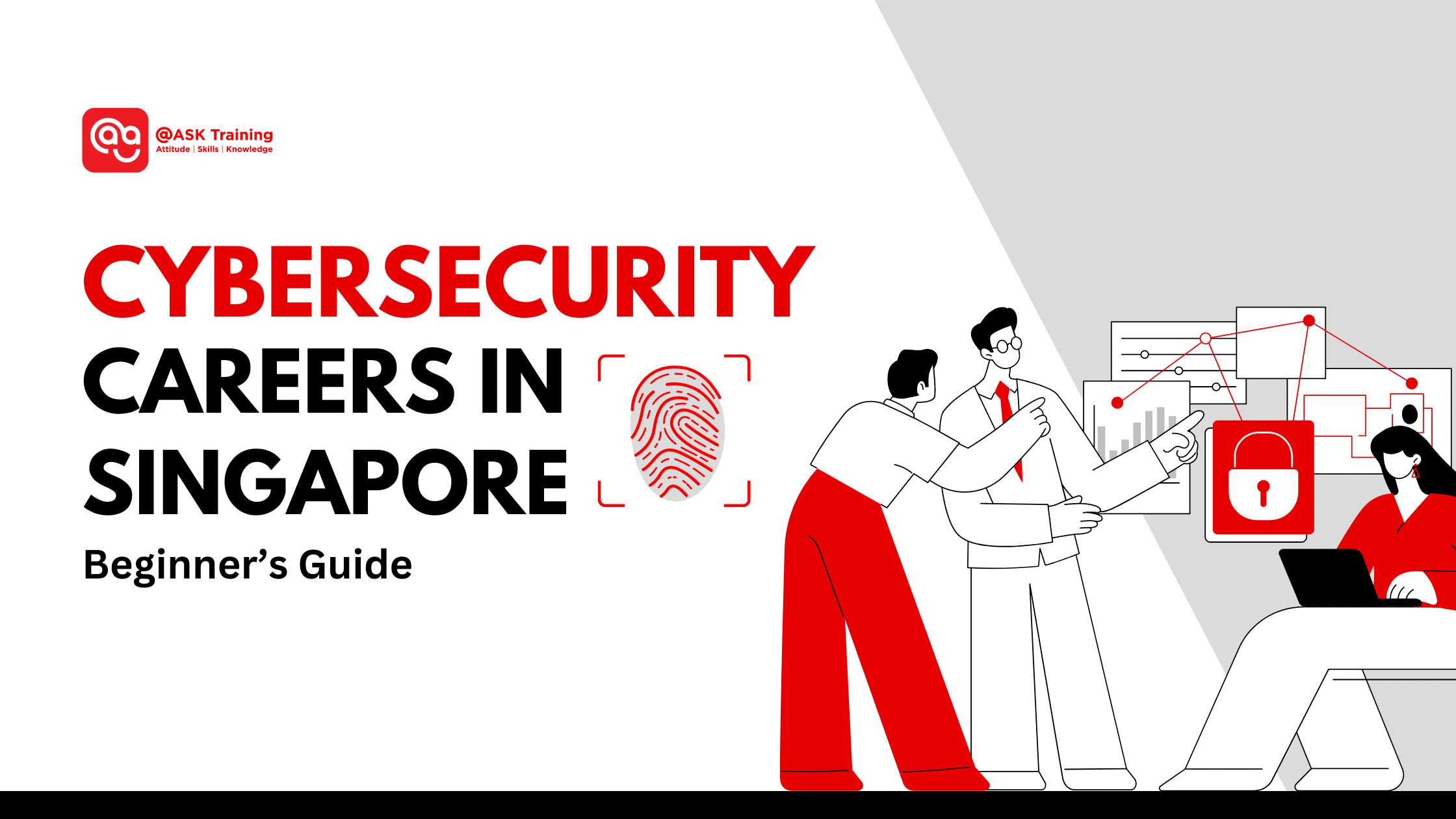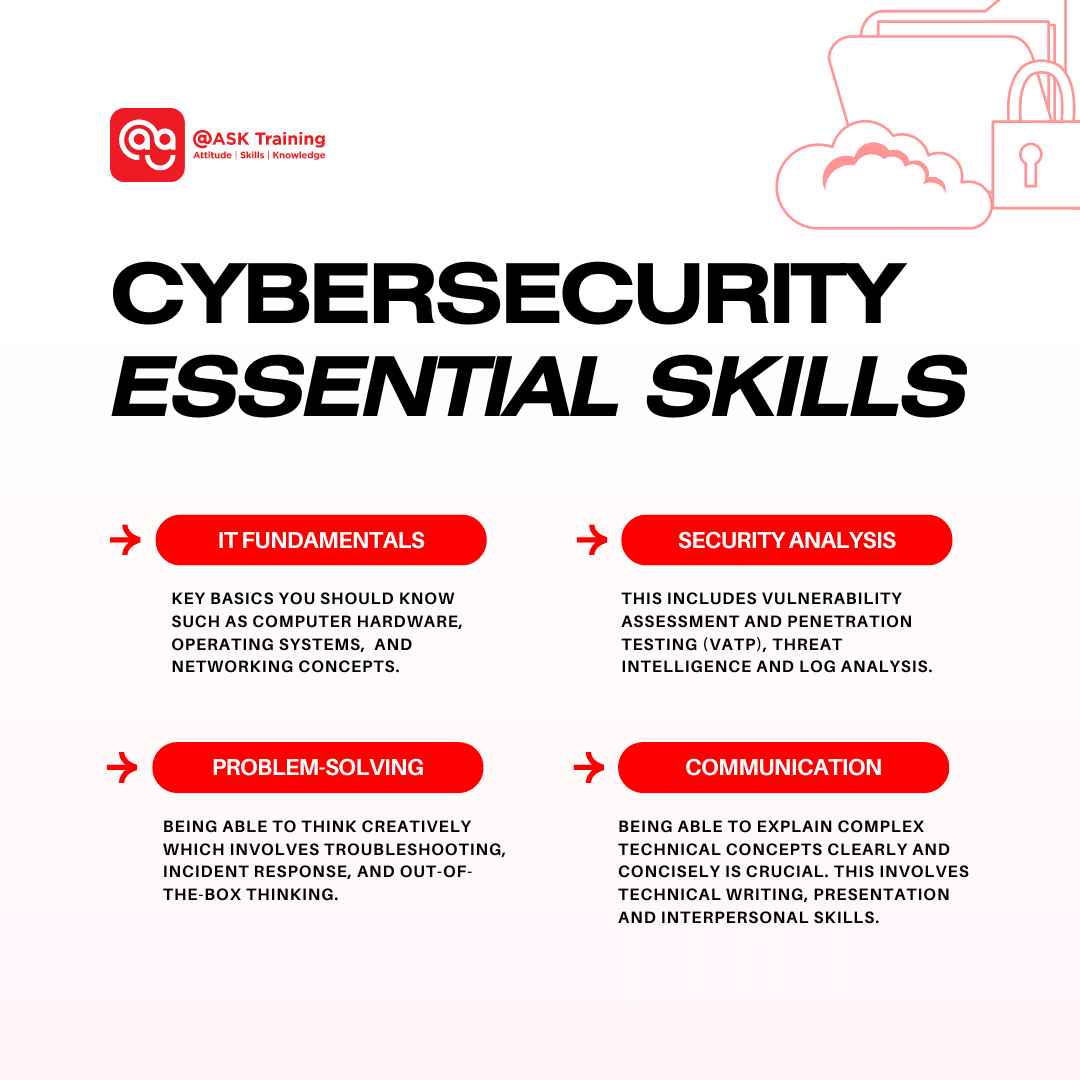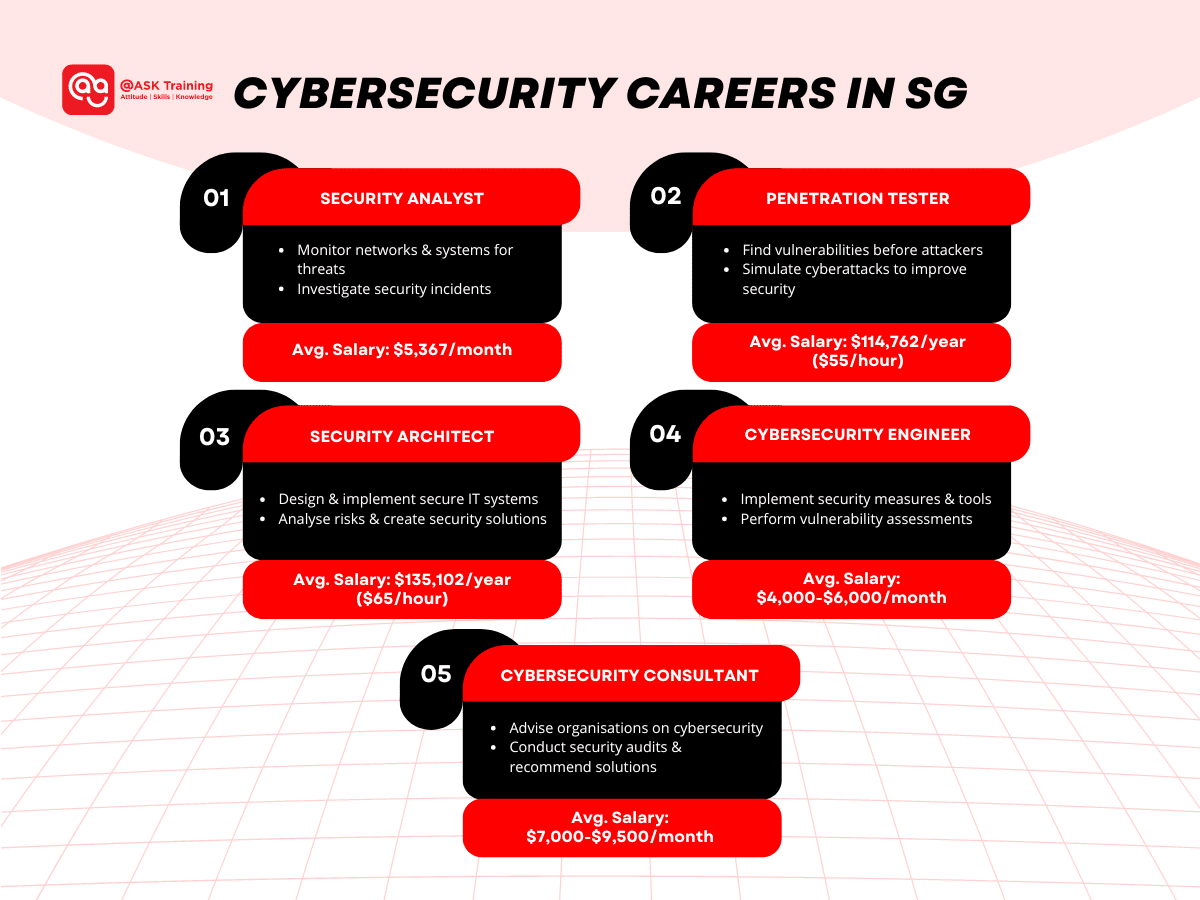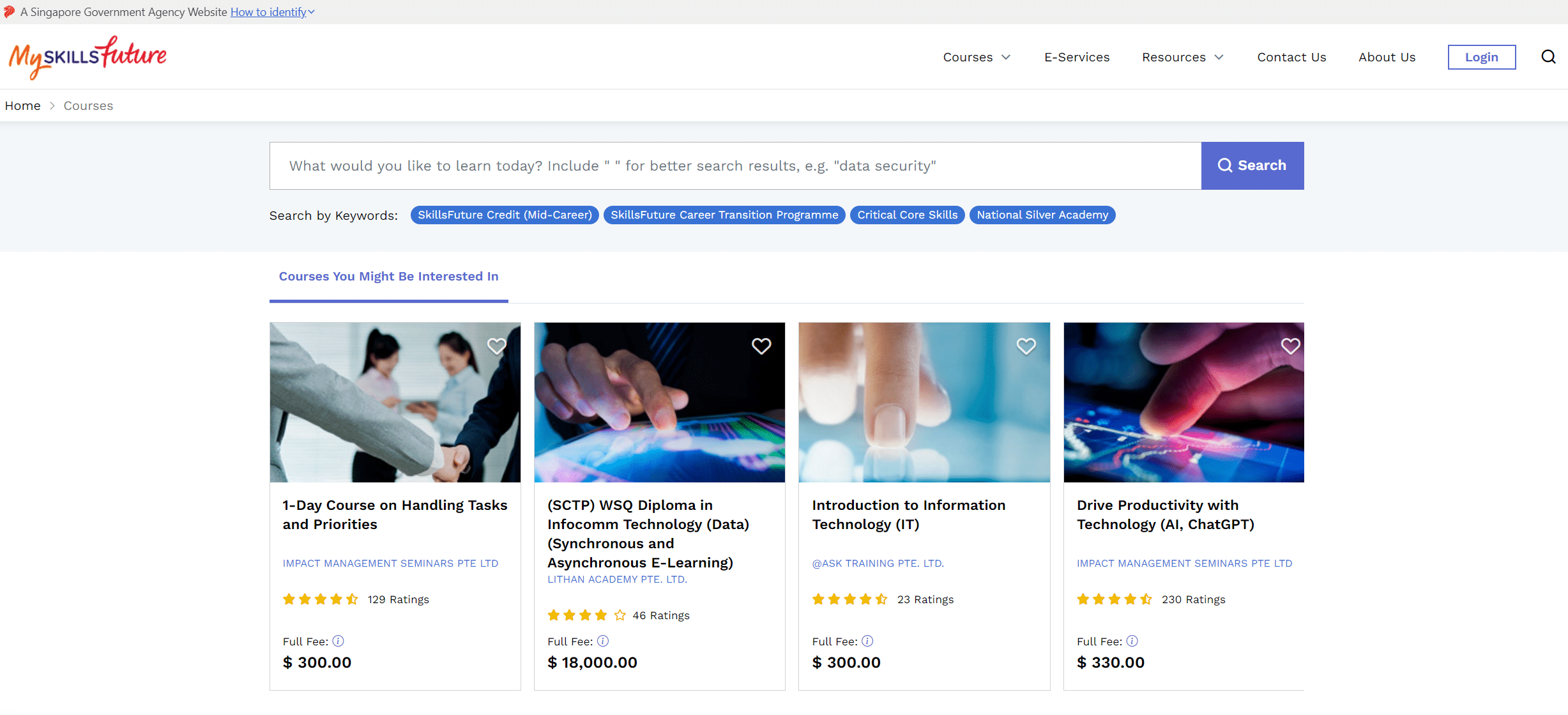
Have you ever seen headlines about data breaches or online scams? As Singapore emerges as a leading Smart Nation, it is constantly implementing various digital initiatives, from cashless payments to government services.
This digital transformation is fantastic for convenience, but it also creates a bigger target for cybercriminals.
That’s where YOU come in! The Singapore government is aiming to create 30,000 new cybersecurity jobs by 2025, according to a press release from the Cyber Security Agency of Singapore (CSA).
This means exciting career opportunities are opening up, and cybersecurity could be your gateway to a high-paying and secure future in the ever-growing IT sector.
Whether you’re new to IT or just curious about cybersecurity, this guide will be your roadmap to getting started.
We’ll rundown what cybersecurity is all about, the essential skills employers are looking for, and the different career paths you can take.
Plus, we’ll explore resources to help you build your skills and land your dream cybersecurity career in Singapore!
Understanding the Cybersecurity Field
With a clearer picture of the growing importance of cybersecurity in Singapore, let’s dive deeper and explore what it entails. Don’t worry, even if you’re new to IT, we’ll break it down in simple terms.
What is Cybersecurity?
Imagine your computer as a digital castle. Keeping it safe requires strong walls and vigilant guards. Cybersecurity is like the entire defence system, protecting our online world from intruders and threats.
What jobs are there within cyber security?
There are different areas within cybersecurity, each specialising in a specific aspect of defence:
Network Security
These are the digital wall builders, ensuring unauthorised access and data breaches stay outside your castle (or network) by setting up secure systems and protocols.
Cloud Security
Think of the cloud as a high-tech vault in the sky where we store valuable data and applications. Cloud Security specialists are the vault guardians, implementing measures to keep everything safe and secure.
Incident Response
These are the special cybersecurity task forces that handle emergencies. If a cyberattack does occur, they’re the ones who minimise damage, respond quickly, and help restore systems to normal.
What are the Essential Skills in Cybersecurity?
To excel in this exciting field, you’ll need to develop a certain skill set. Here are some key areas to focus on:
IT Fundamentals
To build a strong foundation in cybersecurity, you need to understand the basics. Key areas for the fundamentals include:
- Computer Hardware: Knowing the different types of computer hardware components and their functions (e.g., CPUs, RAM, storage devices).
- Operating Systems: Understanding how popular operating systems like Windows, macOS, and Linux work.
- Networking Concepts: Grasping the fundamentals of how computer networks function, including network protocols (e.g., TCP/IP) and network devices (e.g., routers, firewalls).
Security Analysis
Just like detectives, security analysts have a keen eye for detail. This skill involves:
- Vulnerability Assessment & Penetration Testing (VAPT): Learning how to identify weaknesses (vulnerabilities) in systems and networks that attackers could exploit.
- Threat Intelligence: Staying up-to-date on the latest cyber threats and understanding how attackers operate.
- Log Analysis: Being able to analyse security logs to detect suspicious activity and identify potential security incidents.
Problem-Solving
Cybersecurity is full of challenges, so critical thinking and creative problem-solving are essential skills. This involves:
- Troubleshooting: Being able to identify and resolve security issues efficiently.
- Incident Response: Thinking on your feet and making quick decisions during a security incident to minimise damage and restore systems.
- Out-of-the-Box Thinking: Consider different approaches and solutions to overcome complex cybersecurity challenges.
Communication
Being able to explain complex technical concepts clearly and concisely is crucial. You’ll need to explain security risks and solutions to both technical and non-technical audiences:
- Technical Writing: Documenting security procedures and findings clearly and concisely.
- Presentation Skills: Effectively presenting security information to stakeholders, including management and non-technical teams.
- Interpersonal Skills: Collaborating effectively with other cybersecurity professionals and IT teams.
What Would a Cybersecurity Career Path Be Like?
Now that you understand the core areas of cybersecurity and the essential skillset, let’s take a look at some exciting in-demand career paths within this dynamic field:
Security Analyst
These are the watchful guardians of the digital world, constantly monitoring networks and systems for suspicious activity. They analyse security logs, identify potential threats, and investigate security incidents.
Think of them as the cybersecurity detectives, piecing together clues to uncover suspicious activity and prevent cyberattacks. According to Glassdoor, a security analyst’s average salary is $5,367 per month.
Penetration Tester (Pen Tester)
Ever heard of ethical hacking? Pen testers are the good guys who use their hacking skills for good! They work for organisations to identify vulnerabilities in their systems and networks before malicious attackers can exploit them.
Pen testers employ various hacking techniques and tools to simulate real-world cyberattacks, helping organisations strengthen their security posture and stay ahead of threats.
The average penetration tester’s gross salary in Singapore is $114,762 or an equivalent hourly rate of $55.
Security Architect
Imagine a master builder specialising in digital fortresses. Security architects design and implement secure IT systems and infrastructure.
They understand the organisation’s security needs, analyse risks, and create robust security solutions that protect critical data and assets.
Security architects work closely with other IT professionals to ensure all systems align with the organisation’s overall security strategy. The average cybersecurity architect’s gross salary in Singapore is $135,102 or an equivalent hourly rate of $65.
Cybersecurity Engineer
Cybersecurity engineers are the hands-on heroes of the cybersecurity world. They implement the cybersecurity measures designed by security architects, configure security tools and technologies, and perform vulnerability assessments to identify and mitigate security risks.
Security engineers also play a crucial role in maintaining and updating security systems to ensure they remain effective against evolving cyber threats. According to Glassdoor, the average salary for a cybersecurity engineer in Singapore ranges from $4,000 to $6,000 per month.
Cybersecurity Consultant
As a cybersecurity consultant, you’ll leverage your expertise to advise organisations on all aspects of cybersecurity.
This may involve conducting security audits, recommending security solutions, and helping organisations develop and implement effective cybersecurity policies.
Cybersecurity consultants often work with various clients across different industries, offering valuable insights and expertise to help them navigate the complex world of cybersecurity.
The average salary for a cybersecurity consultant in Singapore falls in the range of $7,000 to $9,500 per month. As you gain experience and expertise, your earning potential can increase significantly.
By understanding these diverse career paths, you can start to envision where your interests and skills lie within the vast landscape of cybersecurity.
Remember, this is just a starting point – there are many other specialised roles within the field, each offering unique challenges and opportunities for growth.
Building Your Cybersecurity Foundation
Now that you’re fired up about launching your cybersecurity career, let’s explore the learning or upskilling resources available to equip you with the necessary skills and knowledge.
Free & Paid Training Options
Free Online Courses
Several reputable platforms offer free introductory courses to get you started. Here are a few great options to check out:
1. Cisco Networking Academy: This platform offers a structured curriculum specifically designed to teach networking fundamentals.
(Cisco Networking Academy Homepage)
2. Udemy: Explore a wide range of topics and find courses that align with your specific interests within the cybersecurity field.
(Udemy Cybersecurity Courses Homepage)
3. EC Council: EC Council is a renowned provider of ethical hacking certifications. Their free introductory courses offer a glimpse into the world of ethical hacking.
(EC Council Homepage)
Government-Funded Programmes
The Singapore government recognises the importance of cybersecurity and offers various subsidised training programmes for its citizens. Here are some examples of specialised short courses offered by a SkillsFuture Singapore (SSG) appointed provider such as @ASK Training:
- Cybersecurity Essentials: This programme provides a foundational understanding of cybersecurity principles and best practices.
- Cybersecurity and Ethical Hacking: Learn offensive security techniques used by ethical hackers to identify vulnerabilities and improve your defensive capabilities.
- Advanced IT Security and Cybersecurity: Take your skills to the next level with this advanced programme covering incident response, security architecture, and more.
Cybersecurity Certifications
Earning industry-recognised certifications can significantly enhance your resume and career prospects. Consider pursuing popular entry-level certifications like:
- CompTIA Security+: This vendor-neutral certification validates your core cybersecurity knowledge and skills.
- Certified Ethical Hacker (CEH): Learn ethical hacking methodologies to identify vulnerabilities before attackers do.
Upskilling & Building Your Network
MySkillsFuture Portal
This government initiative provides Singaporeans with resources and funding to support skills development. The portal lists various cybersecurity courses and certifications, allowing you to explore options and potentially tap into financial assistance.
(Source: MySkillsFuture Portal)
Professional Development Programmes
Several reputable institutions in Singapore offer cybersecurity boot camps and professional development programmes. Here’s an example:
Cybersecurity Institute of Singapore (CSIS): Explore their programme offerings to find intensive boot camps or specialised courses catering to your specific interests.
Building Your Online Presence
Showcase your skills and demonstrate your passion for cybersecurity through an online portfolio:
- LinkedIn Profile: Create a compelling profile highlighting your cybersecurity skills, relevant coursework, and certifications.
- Personal Projects: Develop and showcase personal projects, such as participating in capture-the-flag (CTF) competitions where you compete with others to find vulnerabilities in simulated systems.
Join the Cybersecurity Community
Active participation in online communities fosters learning and connects you with cybersecurity professionals:
- Cybersecurity Forums: Engage in discussions with other cybersecurity enthusiasts and experts, learn from their experiences, and stay updated on the latest trends.
- Meetups: Network with like-minded individuals at local cybersecurity meetups and events.
By utilising these free and paid resources, pursuing relevant certifications, upskilling through professional development programmes, and actively engaging with the online community, you’ll build a strong foundation for your cybersecurity career journey in Singapore.
Getting Your Foot in the Door: Landing a Cybersecurity Job
You’ve built a strong foundation through learning and development, and now it’s time to translate your skills into a rewarding cybersecurity career!
This section equips you with essential resources and tips to land your dream job in Singapore’s thriving cybersecurity landscape.
Job Boards & Building Your Network
Job Boards
Leverage popular job boards like MyCareersFuture and LinkedIn to find cybersecurity positions.
Set up job search alerts to stay updated on new openings that match your skills and interests.
Networking Events
The cybersecurity community in Singapore is vibrant and active. Attending industry events, conferences, and meetups is a fantastic way to network with professionals, learn about potential career paths, and gain valuable insights into the industry.
Don’t be afraid to strike up conversations and build connections!
Crafting Your Winning Resume & Cover Letter
Tailoring Your Application
Carefully read job descriptions and tailor your resume and cover letter to highlight the specific skills and experience they seek.
Use relevant keywords throughout your application to increase your visibility in applicant tracking systems (ATS).
Showcasing Your Skills
Don’t just list your experience; showcase your skills and achievements through action verbs and quantifiable results.
If you have relevant volunteer work or personal projects, include them in your resume to demonstrate your initiative and passion for cybersecurity.
Interview Preparation & Nailing the Interview
Practice Makes Perfect
Online resources offer mock interviews tailored to cybersecurity roles in Singapore. Utilise these resources to practice your responses to common interview questions and gain confidence in your interview skills.
Common Interview Questions
Prepare for technical questions assessing your cybersecurity knowledge, along with behavioural questions exploring your problem-solving skills, teamwork capabilities, and approach to cybersecurity challenges. Here are a few common questions as an example:
- “Describe your understanding of a specific cybersecurity threat (e.g., phishing attacks).”
- “How would you approach troubleshooting a security incident?”
- “Explain a time you had to solve a complex problem.”
Cybersecurity Careers: What You Need To Know in 2025
Whether you’re a fresh graduate, exploring a mid-career switch, or simply curious about what the future holds, understanding the landscape is crucial.
Let’s dive into key insights about building a robust cybersecurity career in Singapore in 2025.
Is Cybersecurity a Good Career in Singapore?
Yes – and here’s why it’s one of Singapore’s most promising fields:
- Critical national priority: The government’s Safer Cyberspace Masterplan aims to grow Singapore’s cybersecurity workforce by 30% by 2025.
- Widespread opportunities: From banks to healthcare to SMEs, every sector needs protection.
- Specialisations in demand: Cloud security, GRC (Governance, Risk, Compliance), and threat intelligence roles are particularly sought-after.
With cyber threats continuously evolving, the demand for cybersecurity expertise will only intensify, solidifying this as a secure and forward-looking career choice.
Can You Start a Cybersecurity Career at 30 or 40?
Absolutely! A mid-career switch into cybersecurity is not just possible; it’s common and highly supported in Singapore.
- Mid-career transitions are common: Many individuals, even those without a prior IT background, successfully transition into this dynamic field in their 30s and 40s.
- Government support available: Workforce Singapore’s Career Conversion Programmes (CCPs) provide funding for training and placements.
- Transferable skills matter: Project management, problem-solving, and communication skills from other careers translate well
This strong support system makes pursuing a cybersecurity career a viable and attractive option, no matter your age.
Is Cybersecurity a High-Paying Career?
The answer is a resounding yes! Cybersecurity professionals in Singapore typically command competitive salaries.
While entry-level roles provide a solid foundation, experienced professionals, especially those in specialised and high-demand areas, can expect lucrative compensation.
Here are a few examples:
| Role | Approximate Annual Salary (SGD) |
| Penetration Tester | S$114,000 |
| Cloud Security Architect | S$135,000+ |
| Cybersecurity Manager | S$120,000 |
| Entry-Level Roles | S$48,000 – S$72,000 |
(Source: Morgan McKinley, Glassdoor)
Understanding the compensation potential helps clarify the career’s appeal, but it’s equally important to stay informed about the ever-changing threats and industry responses.
Let’s look at some recent developments.
Recent Cybersecurity Developments (June 2025)
The cybersecurity landscape in Singapore continues to evolve, with recent incidents and initiatives underscoring the need for vigilance and proactive measures.
Here are key updates:
Ransomware Attack on Financial Services
In mid-May 2025, Toppan Next Tech (TNT) suffered a ransomware attack that exposed client statements from DBS Group and Bank of China’s Singapore branch, affecting approximately 8,200 customers.
While DBS confirmed no core banking systems were breached, impacted users were advised to monitor their accounts for suspicious activity.
(Source: Channel News Asia)
Expanded Cyber Trust Mark for Emerging Tech
The Cyber Security Agency of Singapore (CSA) broadened its Cyber Trust Mark in April 2025 to include cloud services, AI platforms, and operational technology.
Aligned with ISO/IEC 27001 standards, this expansion encourages businesses to strengthen security assessments when adopting new digital solutions.
(Source: ReedSmith)
CSA’s Updated Mobile Security Guidelines
As part of its public-awareness efforts, CSA released an updated list of vetted security apps in January 2025 to help consumers guard against phishing and malware. This initiative complements ongoing campaigns like “Unseen Enemy”, which runs through late 2025.
(Source: Cyber Security Agency of Singapore)
Staying updated on these developments is crucial for both professionals and individuals navigating Singapore’s digital landscape.
Let’s Embark on Your Rewarding Cybersecurity Journey
The cybersecurity landscape in Singapore is booming, offering a multitude of exciting career opportunities. With your newfound knowledge, essential skills, and commitment to continuous learning, you’re well-equipped to navigate this dynamic field.
To recap, here’s what awaits you:
- Lucrative and Rewarding Career: Cybersecurity professionals are in high demand, and salaries reflect that. You can expect a stable and well-paying career with excellent growth potential.
- Continuous Learning & Growth: This field is constantly evolving, ensuring you’ll always have opportunities to learn and develop new skills, keeping your career exciting and intellectually stimulating.
- Contributing to a Secure Future: Cybersecurity is more than just a job; it’s a chance to play a vital role in protecting Singapore’s critical infrastructure and digital assets.
Ready to Launch Your IT Career with a Cybersecurity Focus?
@ASK Training’s IT full qualification programmes provide a comprehensive foundation in core IT concepts, equipping you with the necessary skills to launch a successful career in the IT field.
Consider specialising in cybersecurity through their focused modules:
- Cybersecurity Essentials (offered as a 3-day Modular Course for those seeking focused training)
- Cybersecurity and Ethical Hacking
Upon graduation, you’ll benefit from @ASK Training’s post-graduate career support services, including resume writing assistance and connections to potential job opportunities.
Don’t miss out on this exciting opportunity! Contact us today to learn more about our programmes and how we can help you achieve your career goals!
Related Courses
- IT Courses
- Cybersecurity Essentials (offered as a 3-day Modular Course for those seeking focused training)
- Cybersecurity and Ethical Hacking
◆◆◆






